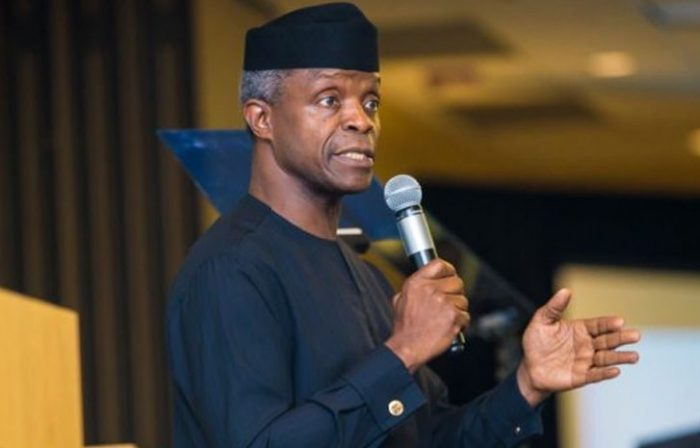The Vice-President, Prof. Yemi Osinbajo, says the Federal Government will do all that is necessary to ensure that the capacities of Nigerian youth are developed and fully utilised.
Osinbajo said this in Abuja on Thursday at the closing ceremony of the National Industrial Skills Development Programme (NISDP) where more than 11,000 youth were equipped with start-up packs by Industrial Training Fund (ITF).
He was represented by the Secretary to the Government of the Federation (SGF), Mr Boss Mustapha.
“This event is an outcome of the policy thrust of the present administration, which is anchored on revamping the economy, fighting corruption, reduction of poverty and the creation of jobs for the teeming unemployed Nigerians.
READ ALSO:Living Faith Church donates relief materials to IDPs in Taraba
“Today, I can say without equivocation that close to four years of this administration, we have achieved most of these targets through the implementation of social investment programmes like N-Power and Trader Money.
“Also we achieved the full implementation of the Economic Recovery and Growth Plan (ERGP), which have had varied impact on all sectors of the National Economy,’’ he said.
Osinbajo said that the greatest challenge of the administration was harnessing the potential of the youthful population for them to contribute meaningfully to the growth of the National economy as entrepreneurs or as employees.
He noted that “United Nations Fund for Population Activities (UNFPA) has projected that by year 2050, Nigeria’s population will hit 500 million.
“When tied with the National Bureau of Statistics (NBS) estimates that over 26 million Nigerians are unemployed despite the numerous initiatives of the Federal Government, it became obvious that more needed to be done,’’ he said.
Osinbajo encouraged hitherto comatose parastatal agencies with mandates for skills acquisition to train Nigerians as a pathway to job creation and poverty reduction by equipping them with entrepreneurial and employability skills.
According to him, one agency that has been at the forefront of this charge is the Industrial Training Fund (ITF).
He said that apart from the graduation of more than 11,000 trainees, the agency in the last two years trained over 450,000 Nigerians and empowered them with start-up packs to start their own businesses.
Mr Joseph Ari, Director-General of the fund, said that trainees were trained in welding and fabrication, plumbing and pipe-fitting, tailoring, aluminium, tiling, Plaster of Paris (POP) installation as well as photography.
According to him, the fund monitoring and evaluation template indicates that where training occurs without the accompanying empowerment tools, the results become less impactful.
Ari said that bearing such in mind, ITF decided to empower all beneficiaries of its skills acquisition programmes with start-up kits.
“Surveys have revealed that in all cases where the trainees were provided with the kits, more than 90 percent earned reasonable livelihood as entrepreneurs. .
READ ALSO:Adopt NLNG’s model to revive Ajaokuta Steel Company- LCCI urges FG
“It is our conviction that training the youth and women without equipping them, defeats the core objective of the programme and the policy of the present administration to create wealth and grow the economy,’’ he said.
Ari said that fund had put in place some skills in order to fill the skills gaps identified by the ITF and United Nations Industrial Development Organisation (UNIDO) Survey.
He said the fund’s target for 2019 was to equip Nigerians with lifelong skills in the agriculture, construction, transport and services sectors that were identified by the survey to have great potential for job creation.
Sen. Sam Egwu, Chairman, Senate Committee on Industry, said that it was not enough to have start-up kits without fund to start the business.
Egwu said that most of the trainees were not in business because of the lack of funds.
He suggested that Central Bank of Nigeria (CBN) and Bank of Industry should be able to give the trainees some loan or grants to put their skills to use.
“After training, some form of money should be given to the trainees to achieve their objective of the programme,’’ he said.
He called on the Federal Government to do more by involving the necessary agencies to give little assistance to the trainees because ITF had done its part.
Egwu said that the Senate was ready to support the programme by passing the necessary bills. (NAN)


